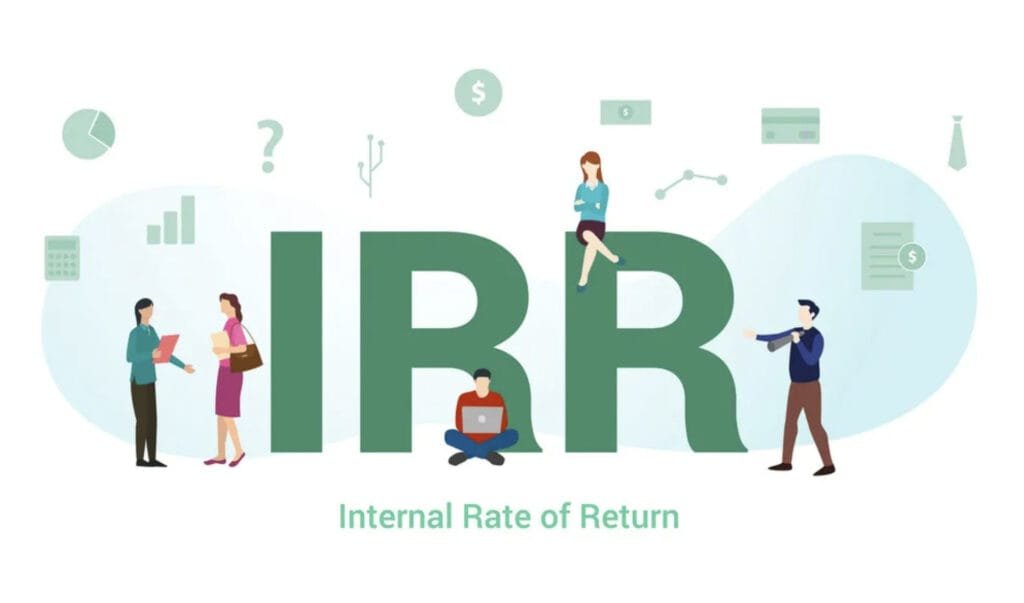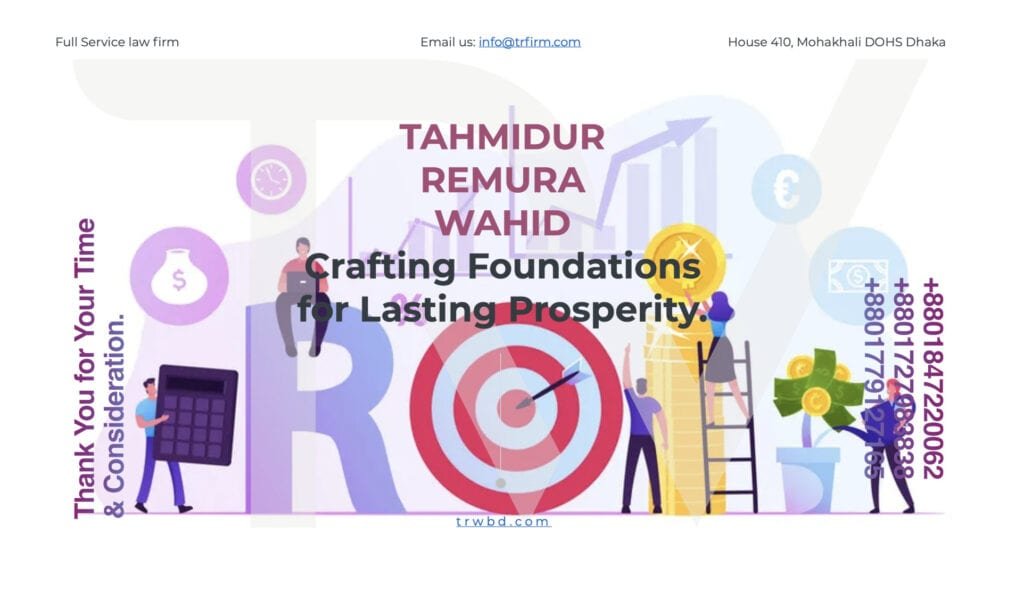Unlocking Investment Potential in Bangladesh: Navigating IRR within Legal Frameworks of Bangladesh
In the realm of financial analysis and investment evaluation in Bangladesh, the Internal Rate of Return (IRR) stands as a fundamental metric that helps investors and businesses estimate the potential profitability of various investment opportunities.
The IRR is a critical tool in the toolkit of financial professionals, aiding in the assessment of projects, capital investments, and business ventures.
A compound interest rate calculated over the life of a private equity fund to reflect both the investment return and the rate at which the return is generated.
The IRR is calculated using an iterative mathematical formula that values the cash spent by the private equity provider (typically subscription monies for shares and loan stock in the new company) and cash returned (typically interest, dividends, share or loan stock redemptions, and share sale proceeds) at the date of exit.
The IRR is the discount factor that provides a net present value of zero when applied to these cash flows. It roughly corresponds to a notional rate of compound yearly interest earned on money invested.

What Is Internal Rate of Return (IRR)?
The Internal Rate of Return, commonly known as IRR, is a financial metric used to evaluate the potential returns of an investment. It is a discount rate that, when applied to the cash flows of an investment, makes the Net Present Value (NPV) equal to zero in a discounted cash flow analysis. In simpler terms, IRR is the annual rate of growth that an investment is expected to generate.
In Bangladesh, where the investment landscape is rapidly evolving, IRR serves as a crucial decision-making tool for both businesses and individuals. It allows investors to assess the attractiveness of various investment options, from real estate to business expansion, by providing a clear picture of the expected annual returns.
Formula and Calculation for IRR
The formula for IRR, though conceptually straightforward, often requires iterative calculations to determine the precise rate. In the context of Bangladesh, where investments vary widely in nature, understanding the IRR formula is essential.
The formula used to calculate IRR is as follows:
0 = Σ CFt ÷ (1 + IRR)^tWhere:
- CFt = Net cash inflow during the period t
- IRR = Internal Rate of Return
- t = The number of time periods
In Bangladesh, this formula becomes particularly relevant when assessing investments that involve initial capital outlays, such as real estate development, infrastructure projects, or manufacturing ventures. The ability to determine the IRR helps investors gauge the profitability and feasibility of such endeavors.

Example of IRR Calculation in Bangladesh
Let’s consider a practical example of IRR analysis in Bangladesh using BDT as the currency. Imagine a company evaluating the profitability of a real estate project named Project X. Project X requires an initial investment of 2,500,000 BDT and is projected to generate annual after-tax cash flows as follows:
- Year 1: 1,000,000 BDT
- Year 2: 1,200,000 BDT
- Year 3: 1,400,000 BDT
- Year 4: 1,600,000 BDT
- Year 5: 1,800,000 BDT
Using the IRR formula, one can calculate the IRR for Project X:
0 = -2,500,000 + 1,000,000 / (1 + IRR)^1 + 1,200,000 / (1 + IRR)^2 + 1,400,000 / (1 + IRR)^3 + 1,600,000 / (1 + IRR)^4 + 1,800,000 / (1 + IRR)^5Solving this equation yields an IRR of approximately 12.29% for Project X. In the context of Bangladesh’s real estate sector, this IRR figure provides valuable insights into the project’s potential return on investment.
Unlocking Investment Potential in Bangladesh: Navigating IRR within Legal Frameworks
In the intricate tapestry of Bangladesh’s investment landscape, the Internal Rate of Return (IRR) emerges as a pivotal financial metric. However, as investors and businesses in Bangladesh engage in assessing potential projects and ventures, they must do so within the contours of the country’s legal and regulatory frameworks. In this exploration, we shall dissect the significance of IRR, its legal implications in Bangladesh, and how it interweaves with specific legal fields and terminology.
IRR: Legal Foundations and Application
The Internal Rate of Return (IRR) stands as a quintessential financial metric, both globally and in Bangladesh. It serves as a benchmark to evaluate the feasibility and profitability of investments, offering insights into the expected annual returns of a venture.
In Bangladesh, where investment opportunities span diverse sectors like real estate, infrastructure, and manufacturing, IRR plays a pivotal role in decision-making. It allows investors and businesses to gauge the financial viability of projects, taking into account various legal considerations.

Legal Fields and Considerations in IRR Analysis
Contract Law: One of the key legal fields that intertwine with IRR analysis is contract law. When assessing investment opportunities, contracts are integral, outlining the terms, obligations, and responsibilities of parties involved. Legal experts in Bangladesh play a crucial role in drafting and reviewing contracts, ensuring compliance with contractual obligations that impact cash flows and, subsequently, IRR.
Real Estate Law: The real estate sector in Bangladesh is burgeoning, attracting investors seeking to capitalize on the country’s growth. IRR calculations for real estate investments are inherently tied to land acquisition, property transactions, and land use regulations. Legal experts navigate the complexities of land ownership laws, ensuring that investments adhere to legal requirements, mitigating risks, and preserving IRR.
Taxation and Financial Law: In Bangladesh, tax implications significantly influence IRR. Income tax, capital gains tax, and value-added tax (VAT) obligations are paramount. Legal practitioners specializing in taxation ensure that IRR calculations incorporate accurate tax figures, optimizing returns and complying with the evolving tax regulations.
Foreign Investment Regulations: Bangladesh welcomes foreign investors, yet stringent regulations exist. Foreign investments often require approvals and compliance with regulatory bodies such as the Bangladesh Investment Development Authority (BIDA). Legal experts guide investors through the labyrinth of foreign investment laws, ensuring IRR calculations align with regulatory requirements.
Dispute Resolution: Bangladesh’s legal framework encompasses dispute resolution mechanisms. When investments face challenges or contractual disputes, legal experts in dispute resolution play a pivotal role in protecting investments and safeguarding IRR. Alternative dispute resolution methods are employed to minimize the impact on investment returns.
| Legal Field | Role in IRR Analysis | Key Considerations |
|---|---|---|
| Contract Law | Drafting and reviewing contracts | Ensuring compliance with contractual obligations. |
| Real Estate Law | Land acquisition and property transactions | Verifying land titles, addressing disputes, and adhering to land ownership laws. |
| Taxation and Financial Law | Tax implications and financial compliance | Incorporating accurate tax figures and VAT obligations into IRR calculations. |
| Foreign Investment Regulations | Regulatory compliance for foreign investors | Guiding foreign investors through BIDA requirements and approvals. |
| Dispute Resolution | Managing investment disputes | Protecting investment returns through alternative dispute resolution methods. |
| Environmental Regulations | Environmental impact assessments (EIA) | Conducting thorough EIA studies and obtaining DoE approvals. |
| Political and Economic Stability | Risk assessment | Monitoring political and economic stability for informed investment decisions. |
| Infrastructure Development | Compliance with urban planning regulations | Aligning projects with zoning requirements and collaborating with local authorities. |
| Land Use Zoning and Planning | Land use regulations | Adhering to land use zoning laws and urban planning requirements. |
| Legal Documentation and Contracts | Contractual soundness | Ensuring contracts are legally sound and comprehensive. |

Case Study: IRR in Bangladesh’s Real Estate Sector
Let’s delve into a real-world example to illustrate how IRR analysis intersects with these legal fields. Consider a foreign investor eyeing a real estate project in Bangladesh. The project involves acquiring land, constructing a commercial complex, and leasing space to local businesses. The investor conducts a comprehensive IRR analysis, factoring in legal considerations:
- Land Acquisition: Legal experts verify land titles, conduct due diligence, and address any disputes or ambiguities. This diligence ensures that land acquisition aligns with land ownership laws and is a critical component of IRR calculations.
- Contracts and Agreements: Lawyers draft contracts outlining the terms of land purchase, SPV contracts, SPA contracts, construction agreements, and lease agreements with tenants. Ensuring these contracts are legally sound and comprehensive is vital to safeguarding the IRR.
- Taxation: Tax consultants assess the tax obligations tied to rental income, capital gains, and VAT. Accurate taxation figures are integrated into the IRR analysis, impacting the project’s financial viability.
- Foreign Investment Compliance: Legal experts guide the foreign investor through the regulatory framework, ensuring compliance with BIDA requirements. The IRR analysis incorporates regulatory hurdles and approvals.
- Dispute Resolution: In the event of disputes with tenants, contractors, or regulatory bodies, dispute resolution mechanisms are activated. Legal professionals work diligently to protect the investment’s returns and minimize disruptions to the IRR.
In Bangladesh, the Internal Rate of Return (IRR) is not merely a financial metric; it is a compass guiding investors and businesses through a multifaceted legal landscape. The legal fields of contract law, real estate law, taxation, foreign investment regulations, and dispute resolution converge with IRR analysis, shaping investment decisions and outcomes.
As Bangladesh continues its journey of economic growth and development, the prudent application of IRR within the legal frameworks is paramount. Legal experts and financial analysts work hand in hand to optimize IRR, mitigate risks, and ensure investments align with regulatory requirements.
In essence, IRR in Bangladesh serves as a bridge between financial aspirations and legal realities, unlocking the nation’s investment potential while upholding the rule of law. In this dynamic and evolving investment environment, the harmonious synergy of finance and law paves the way for sustainable development and prosperity.
Using IRR in Bangladesh: Real-world Applications
In Bangladesh, where economic growth and infrastructure development are on the rise, the application of IRR is widespread and diverse:
- Real Estate Investments: The booming real estate market in Bangladesh attracts investors seeking to maximize their returns. IRR analysis is employed to assess the profitability of real estate projects, whether they involve residential, commercial, or industrial properties. The higher the IRR, the more desirable the investment.
- Infrastructure Projects: Bangladesh’s infrastructure development is a top priority, with projects ranging from road construction to power plants. IRR is instrumental in evaluating the financial viability of such endeavors, helping the government and private investors make informed decisions.
- Business Expansion: Local businesses looking to expand or diversify their operations use IRR to compare different expansion opportunities. It assists in determining which project is likely to yield the highest returns.
- Capital Budgeting: IRR is a vital tool for capital budgeting decisions. Companies can use it to compare the profitability of launching new operations versus expanding existing ones. For example, an energy company might utilize IRR to decide between opening a new power plant or renovating an existing one.
- Stock Buyback Programs: Corporations often employ IRR to assess the attractiveness of stock buyback programs. It helps determine whether allocating funds to repurchase company shares generates a higher IRR than other uses of capital.

Challenges and Considerations
While IRR is a valuable tool in the financial arsenal, it is not without limitations. In Bangladesh, as in other countries, investors and businesses must be aware of these challenges:
- Projections and Assumptions: IRR relies on estimates of future cash flows, making it sensitive to the accuracy of these projections. Investors should exercise caution and conduct thorough due diligence when making assumptions.
- Multiple IRRs: In cases with unconventional cash flow patterns, IRR analysis may yield multiple IRRs, creating ambiguity. Careful interpretation and additional financial metrics may be necessary.
- Comparison with WACC: IRR should be compared to the Weighted Average Cost of Capital (WACC). Projects with IRRs above the WACC are generally considered profitable. However, this comparison may not always be sufficient for longer-term projects with varying discount rates.
- Scenario Analysis: To mitigate risks associated with IRR estimates, scenario analysis should be employed. Considering various scenarios helps assess the impact of changing assumptions on investment returns.
Hire the best Investment law firm for your upcoming project in Bangladesh:
On a global scale, the investment management business is currently undergoing tremendous regulatory upheaval. Tahmidur Rahman Remura Wahid TRW is well-positioned to address these issues for clients in investment management.
The business is made up of a broad group of players, ranging from corporations, financial institutions, and sovereign wealth funds to individuals, all of whom manage quite distinct and frequently disparate assets in accordance with very different strategies. A worldwide private equity firm’s needs, for example, are significantly different from those of a start-up hedge fund manager.
However, both confront the same investor expectations for improved performance. With the new world of heightened regulation and its extra-territorial application, as well as the increasing demands of investors for a more institutional approach, the job of an investment manager is more difficult than ever.

Our understanding of each component of the investment management industry, combined with our global network of expertise, enables us to tailor our advice to a client’s specific needs while also providing access to the most recent market thinking and advice from around the world, whether under Dodd-Frank or in relation to AIFMD or EMIR.
We provide advice on fund creation, licensing, taxation, transactional and M&A transactions, as well as contentious matters. We also provide advice on regulation affecting the investment management industry across financial markets, covering all current developments. With the help of expert lawyers from our global network, we can provide a global or local solution, including guidance on the impact of extra-territorial legislation in each jurisdiction.
We collaborate with our debt finance team to provide our clients with a complete capital financing platform. Our Fund financing practice advises lenders and borrowers on a wide range of fund-level financing solutions, as well as general partner facilities. Our experience includes capital call (subscription) bridge finance, leveraged NAV facilities, and hybrid financing, which may include preference interests, securitisation treatment, or other specialized solutions.
Our clientele include some of the world’s most prestigious asset management firms, alternative investment funds, private equity funds, insurance organizations, and private banking firms. They range in size from multinational corporations with a five-continent presence to start-up or spin-off funds.
GLOBAL OFFICES:
DHAKA: House 410, ROAD 29, Mohakhali DOHS
DUBAI: Rolex Building, L-12 Sheikh Zayed Road
LONDON: 1156, St Giles Avenue, Dagenham
Email Addresses:
info@trfirm.com
info@tahmidur.com
info@tahmidurrahman.com
24/7 Contact Numbers, Even During Holidays:
+8801708000660
+8801847220062
+8801708080817



